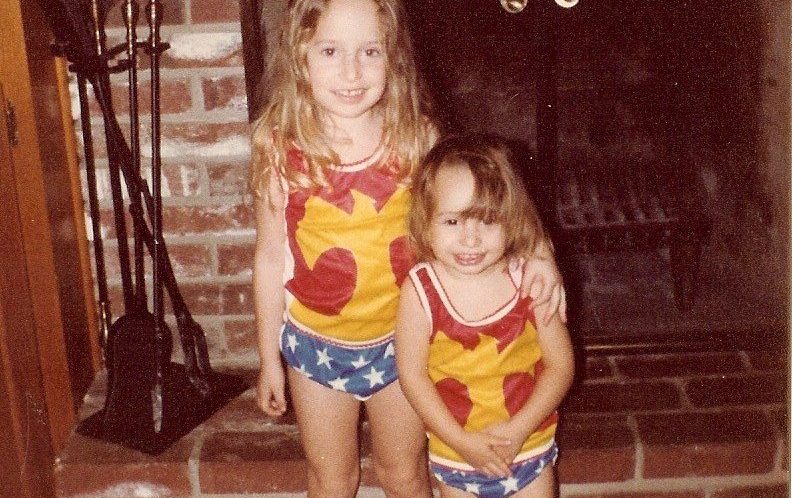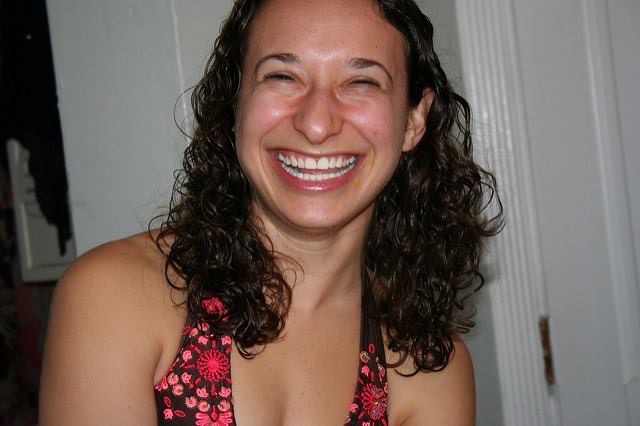
Jen and her sister, Stacey, as children. (Courtesy of Jen Simon)
My mouth cannot contain the horror. The words spill out to everyone I see. “I recently lost my sister,” I say.
To my son’s teacher.
To another mom at the playground.
To the woman in front of me in line at CVS.
Nearly every conversation unfolds the same way: “I’m so sorry,” they reply, “was she sick?”
“Yes,” I say without hesitation.
My sister died three days before she would have turned 39; she will be 38 forever. And 38-year-olds are not supposed to die. I don’t know how many people expect me to say she had cancer, but I assume it’s the vast majority. What else could steal a woman in her prime?
“Yes, she was sick. She had depression.”
They’re inevitably caught off guard. They suck in their breath. Widen their eyes. No one, no matter what they expect, no one expects that answer. They assume I had meant a real disease, a physical disease in which the body turns against itself. But it was her mind that turned against her. My sister’s immune system wasn’t compromised; her thoughts were.

Jen and Stacey (Courtesy of Jen Simon)
Because mental illnesses don’t always have a physical manifestation, we don’t consider them fatal. And if they’re well-hidden well, we may not even consider them diseases at all. But mental illnesses can be debilitating, and they can be deadly.
“We lost her to depression,” I tell people if our conversation begins another way.
I don’t know a better way to explain it. I refuse to say she killed herself because she, the real her, didn’t make that decision. My real sister was buried under an avalanche of delusional depression that manifested in suicidal ideation.
READ: A Day in the Life of My Grief — Illustrated
For the vast majority of her life, my sister could be described by one word: joy. She loved her family and friends. She appreciated nature and was outside as much as possible. She relished good food. Her greatest motivation was helping other people – she was a yoga teacher, had her masters in social work, and designed healthy, clean-eating programs for clients. She was devoted to her sons, only 6 and 9 when she died. She practiced gratitude. She loved life. She didn’t want to die.
I don’t know how many people expect me to say she had cancer, but I assume it’s the vast majority.
Her mental illness revealed itself in 2005, when she was she was 24. And after surviving five major depressive episodes prior to 2018, her greatest fear was that the disease, which was so at odds with her true personality, would steal her. Permanently.
She knew she was getting sick in January of 2018 and reached out for help. For 10 months, a team of people – my parents, her husband, his parents, her friends, her therapist, her two psychiatrists – fought to keep her safe from herself. They thwarted three attempts. Her disease outwitted them; they could not stop the fourth.

Stacey (Courtesy of Jen Simon)
She didn’t choose death. Over and over again, my sister chose life. But she was compelled by a force larger than herself. It may have appeared that she was in control, but she wasn’t. Depression was in control.
Her disease wasn’t visible to people who didn’t know she was suffering. She didn’t appear to be dying. But now that she’s gone, I can see that’s how she spent January through October of 2018 – she was dying.
“Oh,” people respond. Sometimes they say things like “Huh. I never thought of it like that before.” Or the others who don’t say it out loud – I watch it register across their face; I watch as they realize that, yes, depression can be a disease. Even a fatal one. “Yeah, I guess it is a disease,” I’ve heard over and over.
READ: Having a Dead Sibling Is Full of Contradictions
Depression is a disease, I remind myself when I’m angry and can’t stop crying and can’t understand and can’t stop blaming or hating.
My psychiatrist offered me the lifeline I cling to. He told me: She had a fatal illness. She had a chronic, treatment-resistant, fatal mental illness. I write that on the front page of every journal I burn through. She had a chronic, treatment-resistant, fatal mental illness. I text those words to my friends and her friends every few weeks. I post them on Facebook. I write it on Post-It notes inside my medicine cabinet.
She had a chronic, treatment-resistant, fatal mental illness.
You don’t blame someone when their cells attack each other. How can you blame someone when their brain attacks itself?
My sister wasn’t defined by her disease, but she was sick and her chronic, treatment-resistant mental illness killed her. I miss her every minute of every day.
Jen Simon writes about motherhood, depression, relationships and addiction. She’s on Twitter @NoSleepinBklyn, Facebook and Instagram.










